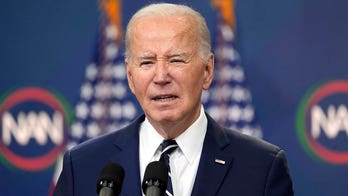Virginia voters today elected a governor from the same party as the sitting president -- breaking a more than three-decade trend.
Democrat Terry McAuliffe’s win over Republican Ken Cuccinelli came mainly from strong support among women -- unmarried women in particular -- as well as a sense that the Republican was too conservative.
Voters today were more likely to say Cuccinelli is “too conservative” (50 percent) than McAuliffe is “too liberal” (41 percent).
Overall, 37 percent say the Republican’s positions on the issues are “about right,” while 48 percent say the same of the Democrat.
Meanwhile, only three percent of Democrats said McAuliffe is “too liberal,” while 22 percent of Republicans said Cuccinelli’s positions on the issues are “too conservative.”
Cuccinelli’s strongly conservative views on issues like abortion hurt him with female voters. Women backed McAuliffe by a nine percentage-point margin. In 2009, women preferred Republican gubernatorial candidate Bob McDonnell (who is also pro-life, but less conservative) by eight points.
Unmarried women went for McAuliffe by a wide 67-25 percent margin.
Today’s vote among men was split: 45 percent McAuliffe to Cuccinelli’s 48 percent.
Each candidate received strong backing from their party faithful. Yet, McAuliffe did a bit better here too: 95 percent of Democrats backed him, while 92 percent of Republicans supported Cuccinelli. Four percent of Republicans voted for McAuliffe.
Independents split their vote three ways: 47 percent for Cuccinelli, 38 percent for McAuliffe and 15 percent for third-party candidate Robert Sarvis.
While 46 percent of Virginia voters support Obamacare, a 53-percent majority oppose it. That includes 41 percent who said they “strongly” oppose the law. Cuccinelli tried to make the race a referendum on the health care law and President Obama, who campaigned with McAuliffe over the weekend. That wasn’t successful, despite a 53-percent majority disapproving of the job Obama’s doing as president. Just 46 percent approve. That’s down from the 51 percent of the vote Obama received in Virginia in 2012.
By a slim three-point margin Virginians blamed the shutdown on Republicans in Congress over percent President Obama (48-45 percent). Among the 32 percent saying they were affected by the shutdown, McAuliffe topped the Republican by 56-37 percent.
At the same time, by a 42-28 percent margin, Virginia voters said they oppose the tea party movement, with which Cuccinelli is often identified. Another 28 percent said they are neutral.
Nearly half of voters -- 45 percent -- said the economy was the top issue to their vote for governor, followed by health care (27 percent) and abortion (20 percent). Cuccinelli had the edge among economy voters (+6) and health care voters (+4), while McAuliffe had a whopping 25-point advantage among abortion voters.
Both McAuliffe and Cuccinelli were tainted by questionable business deals and voters took note: majorities said McAuliffe (57 percent) and Cuccinelli (54 percent) lack high ethical standards.
Was the Libertarian candidate Sarvis a spoiler? In a word: no. In a straight two-way matchup, voters preferred McAuliffe to Cuccinelli by two points. That’s almost identical to the final outcome. In fact, Sarvis drew from independents and moderates, and took at least as many votes from the Democrat as the Republican.
Cuccinelli can’t blame outgoing Governor Bob McDonnell for his loss, as more Virginia voters approve than disapprove of his job performance (52-41 percent).
Finally, more voters today identified as Democrat than Republican by five points. In 2009, Republicans outnumbered Democrats by four points (and Republican Bob McDonnell won by 18 points). In last year’s presidential election, more Virginia voters considered themselves Democrats by seven points (and Democrat Barack Obama won by 3 points).
The number of independents -- about 30 percent -- has mostly held steady over the last four years.
Methodology: Edison Research conducted this exit poll for Fox News and interviewed 2,376 voters as they left randomly selected polling places in Virginia.




